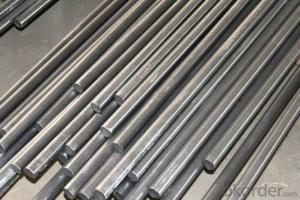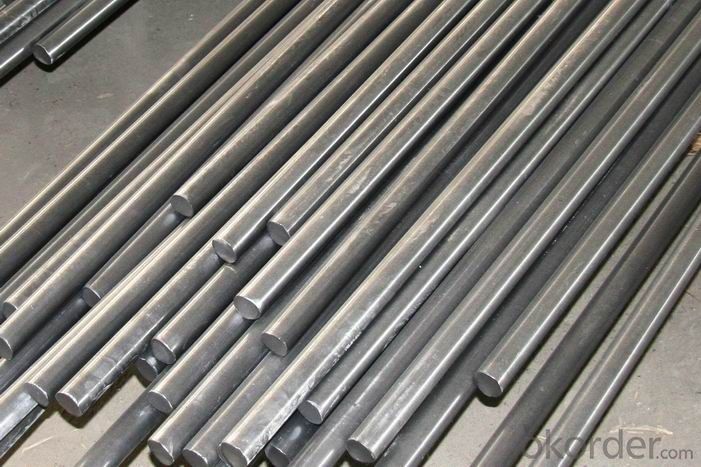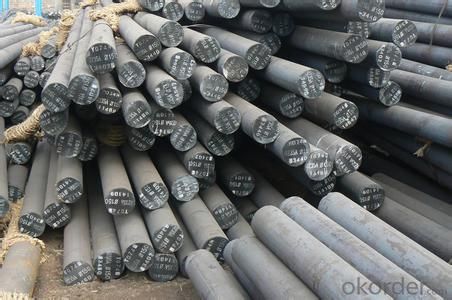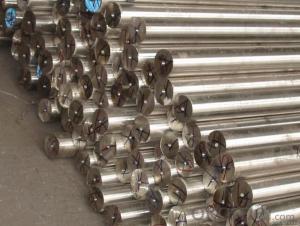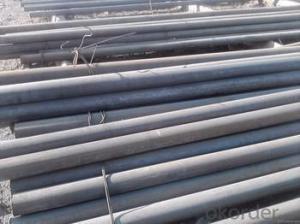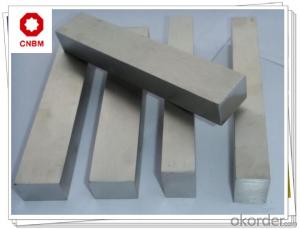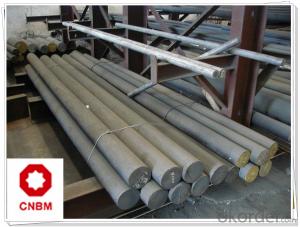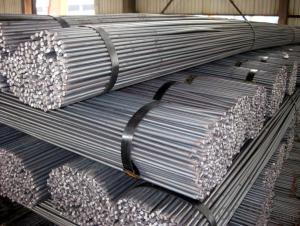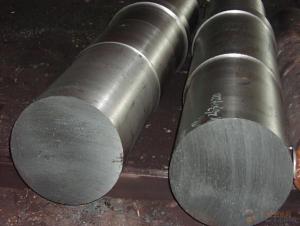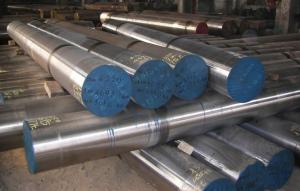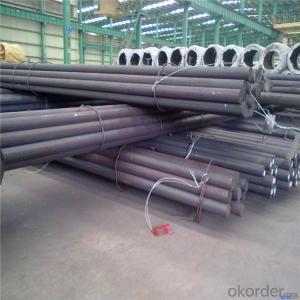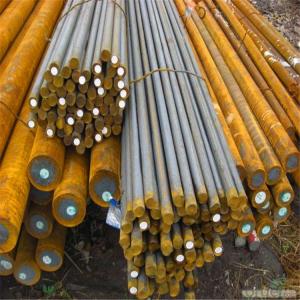Round Bar For Bearing G20
- Loading Port:
- China Main Port
- Payment Terms:
- TT or LC
- Min Order Qty:
- -
- Supply Capability:
- -
OKorder Service Pledge
OKorder Financial Service
You Might Also Like
Product Description:
OKorder is offering high quality Hot Rolled Steel I-Beams at great prices with worldwide shipping. Our supplier is a world-class manufacturer of steel, with our products utilized the world over. OKorder annually supplies products to European, North American and Asian markets. We provide quotations within 24 hours of receiving an inquiry and guarantee competitive prices.
Product Applications:
Hot Rolled Steel I-Beams are ideal for structural applications and are widely used in the construction of buildings and bridges, and the manufacturing, petrochemical, and transportation industries.
Product Advantages:
OKorder's Steel I-Beams are durable, strong, and resist corrosion.
Main Product Features:
· Premium quality
· Prompt delivery & seaworthy packing (30 days after receiving deposit)
· Corrosion resistance
· Can be recycled and reused
· Mill test certification
· Professional Service
· Competitive pricing
Product Specifications:
Manufacture: Hot rolled
Grade: Q195 – 235
Certificates: ISO, SGS, BV, CIQ
Length: 6m – 12m, as per customer request
Specifications of Special Steel:
Grade | bearing steel EN-31 |
Dimensions | Diameter: 20-280mm Length: 2000-5800mm |
Shape | Round Bar |
Type | High chromium bearing steel |
HBS | <220 |
Standard | AISI |
Technique | Hot Rolled |
FAQ:
Q1: Why buy Materials & Equipment from OKorder.com?
A1: All products offered byOKorder.com are carefully selected from China's most reliable manufacturing enterprises. Through its ISO certifications, OKorder.com adheres to the highest standards and a commitment to supply chain safety and customer satisfaction.
Q2: How do we guarantee the quality of our products?
A2: We have established an advanced quality management system which conducts strict quality tests at every step, from raw materials to the final product. At the same time, we provide extensive follow-up service assurances as required.
Q3: How soon can we receive the product after purchase?
A3: Within three days of placing an order, we will begin production. The specific shipping date is dependent upon international and government factors, but is typically 7 to 10 workdays.
Q4: What makes stainless steel stainless?
A4: Stainless steel must contain at least 10.5 % chromium. It is this element that reacts with the oxygen in the air to form a complex chrome-oxide surface layer that is invisible but strong enough to prevent further oxygen from "staining" (rusting) the surface. Higher levels of chromium and the addition of other alloying elements such as nickel and molybdenum enhance this surface layer and improve the corrosion resistance of the stainless material.
Q5: Can stainless steel rust?
A5: Stainless does not "rust" as you think of regular steel rusting with a red oxide on the surface that flakes off. If you see red rust it is probably due to some iron particles that have contaminated the surface of the stainless steel and it is these iron particles that are rusting. Look at the source of the rusting and see if you can remove it from the surface.
Images:
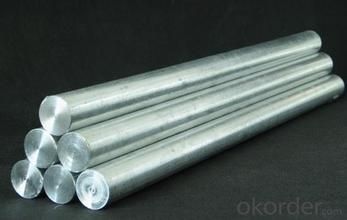
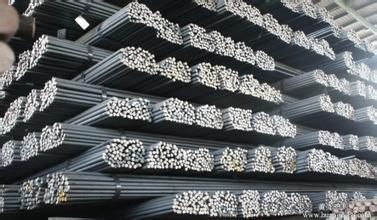
- Q: What are the quality control measures for steel round bars?
- The quality control measures for steel round bars typically include visual inspection, dimensional checks, chemical composition analysis, mechanical testing, and surface finish evaluation. These measures help ensure that the round bars meet the required specifications and standards, guaranteeing their strength, durability, and overall quality.
- Q: Can steel round bars be used in marine environments?
- Yes, steel round bars can be used in marine environments. However, it is important to choose the right type of steel that is specifically designed for marine applications. Stainless steel is the most commonly used type of steel in marine environments due to its corrosion-resistant properties. It contains a high percentage of chromium, which forms a protective oxide layer on the surface of the steel, preventing corrosion from saltwater and other harsh elements. Additionally, stainless steel round bars are known for their strength and durability, making them suitable for various marine applications such as shipbuilding, offshore structures, and marine equipment. Regular maintenance and proper care are also essential to ensure the longevity and performance of steel round bars in marine environments.
- Q: What is the hardness of a steel round bar?
- The hardness of a steel round bar can vary depending on the specific type of steel used and the manufacturing process, but it is typically measured on the Rockwell or Brinell hardness scales.
- Q: How do steel round bars compare to stainless steel round bars?
- Steel round bars and stainless steel round bars have some key differences that make them suitable for different applications. One of the main differences between steel and stainless steel round bars is their composition. Steel is primarily made of iron, with small amounts of carbon and other elements. Stainless steel, on the other hand, is an alloy composed of iron, chromium, and often other elements like nickel or molybdenum. This composition gives stainless steel its unique properties, such as corrosion resistance. In terms of strength, both steel and stainless steel round bars can be manufactured to have high tensile strength. However, stainless steel generally has higher tensile strength compared to regular steel, making it more suitable for applications that require additional strength and durability. Another important difference is their resistance to corrosion. Stainless steel round bars have excellent corrosion resistance due to the presence of chromium in their composition. This makes them ideal for applications where they will be exposed to moisture, chemicals, or other corrosive environments. Steel round bars, on the other hand, are more susceptible to rust and corrosion and may require additional protective coatings in such environments. In terms of cost, steel round bars are generally more affordable compared to stainless steel round bars. The higher cost of stainless steel is due to its unique properties and the additional alloying elements required in its production. Both steel and stainless steel round bars have their own advantages and applications. Steel round bars are commonly used in construction, manufacturing, and general-purpose applications where corrosion resistance is not a primary concern. Stainless steel round bars, on the other hand, find extensive use in industries such as food processing, chemical processing, medical equipment, and marine applications, where corrosion resistance is crucial. In summary, the choice between steel round bars and stainless steel round bars depends on the specific requirements of the application. Steel round bars are more affordable but may require additional corrosion protection, while stainless steel round bars offer superior corrosion resistance and strength.
- Q: Can steel round bars be used for making interior components?
- Yes, steel round bars can be used for making interior components. They are often used in various applications such as handrails, furniture, fixtures, and decorative elements due to their strength, durability, and versatility.
- Q: Can steel round bars be used in the manufacturing of bearings?
- Yes, steel round bars can be used in the manufacturing of bearings. Steel is a common material used for bearing manufacturing due to its high strength, durability, and ability to withstand heavy loads and friction. The steel round bars are typically machined and processed to form the bearing components, such as the inner and outer rings, rollers, or balls, which are then assembled to create the final bearing product.
- Q: What are the advantages of using steel round bars compared to other materials?
- Steel round bars offer several advantages over other materials. Firstly, steel is known for its exceptional strength and durability. With its high tensile strength, steel can withstand heavy loads and pressure without deforming or breaking. This makes steel round bars perfect for applications that require structural support or load-bearing capabilities. Furthermore, steel is a highly versatile material that can be easily shaped and molded into various forms, including round bars. This flexibility in design makes steel round bars suitable for a wide range of applications, whether it be in construction, manufacturing, or the automotive industry. They can be customized to meet specific requirements. In addition to its strength and versatility, steel is also corrosion-resistant. It naturally resists rust and other forms of corrosion, making it ideal for both indoor and outdoor use. Steel round bars can withstand exposure to moisture, chemicals, and harsh environmental conditions, ensuring their longevity. Another advantage of steel round bars is their cost-effectiveness. Although the initial cost of steel may be higher than that of other materials, its long-term benefits and durability make it a cost-effective choice. Steel round bars require minimal maintenance and can last for decades without the need for replacement or repair, resulting in significant cost savings over time. Moreover, steel is a sustainable material. It is 100% recyclable and can be reused multiple times without losing its properties or quality. By choosing steel round bars, one contributes to reducing waste and conserving resources, making it an environmentally friendly choice. In conclusion, the strengths of steel round bars compared to other materials lie in their strength, versatility, corrosion resistance, cost-effectiveness, and sustainability. These qualities make steel round bars the preferred choice for various applications, guaranteeing long-lasting and reliable performance.
- Q: What are the different types of steel round bars used in the manufacturing of bearings?
- There are several types of steel round bars that are commonly used in the manufacturing of bearings. These include: 1. Carbon steel round bars: They are durable and have good hardness, making them suitable for general-purpose bearings. 2. Chrome steel round bars: These bars have a higher hardness and better wear resistance, making them ideal for high-load and high-speed applications. 3. Stainless steel round bars: They provide excellent corrosion resistance and are commonly used in bearings for corrosive environments or food-grade applications. 4. Tool steel round bars: These bars have superior toughness and wear resistance, making them suitable for heavy-duty and high-temperature applications. Overall, the choice of steel round bar depends on the specific requirements and operating conditions of the bearings.
- Q: Can steel round bars be used in the manufacturing of machinery?
- Yes, steel round bars can be commonly used in the manufacturing of machinery. The high strength, durability, and versatility of steel make it an ideal material for various components and parts used in machinery production. Steel round bars can be machined, welded, and formed into desired shapes, making them suitable for use in shafts, gears, axles, and other critical machine components.
- Q: What are the advantages of using phosphorus-alloy steel round bars?
- There are several advantages of using phosphorus-alloy steel round bars: 1. Increased strength: Phosphorus-alloy steel round bars have a higher tensile strength compared to standard steel bars. This increased strength makes them suitable for applications that require greater load-bearing capacity, such as construction and automotive industries. 2. Enhanced corrosion resistance: Phosphorus-alloy steel has a higher resistance to corrosion compared to regular steel. This makes it more durable and long-lasting, especially in environments with high moisture or exposure to chemicals. 3. Improved machinability: Phosphorus-alloy steel has excellent machinability, which means it can be easily shaped, cut, and formed into various designs or structures. This characteristic makes it a preferred choice for industries that require precise shaping, such as manufacturing and engineering. 4. Reduced brittleness: Phosphorus-alloy steel has a lower brittleness factor compared to other types of steel. This means it is less likely to break or fracture under sudden impact or stress, making it a safer option for applications where structural integrity is crucial. 5. Cost-effective: Despite its enhanced properties, phosphorus-alloy steel round bars are still cost-effective compared to other specialty alloys. This makes them a more affordable choice for industries that require high-performance materials without breaking the budget. 6. Improved weldability: Phosphorus-alloy steel round bars have excellent weldability, allowing for easy and secure welding connections. This characteristic makes them suitable for applications that require strong and reliable welded joints, such as construction or fabrication projects. In summary, phosphorus-alloy steel round bars offer increased strength, enhanced corrosion resistance, improved machinability, reduced brittleness, cost-effectiveness, and improved weldability. These advantages make them a preferred choice for various industries where high-performance materials are required.
Send your message to us
Round Bar For Bearing G20
- Loading Port:
- China Main Port
- Payment Terms:
- TT or LC
- Min Order Qty:
- -
- Supply Capability:
- -
OKorder Service Pledge
OKorder Financial Service
Similar products
Hot products
Hot Searches
Related keywords
